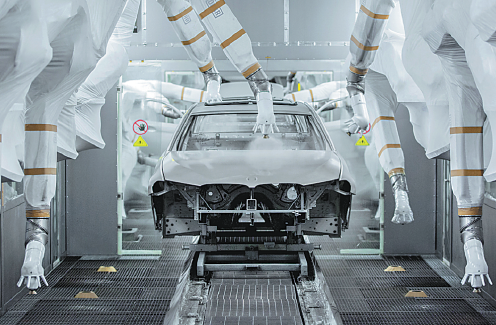Three-year plan aims to upgrade variety of significant industries, officials say
Once a major part of the country's heavy industrial hub in Northeast China, Liaoning province launched special actions earlier this year to revitalize its industries and develop a new growth engine.
The special action plan from 2021 to 2023, stipulated by the Liaoning Provincial Industry and Informatization Department, aims to upgrade and improve industries in three big categories: the traditionally leading industries, the raw materials and processing industries and the emerging industries.
"We have set up a special work team and carried out surveys and investigations in different cities to figure out the actual situations of our industries," said Shen Shiying, the department's deputy director. "We then intensively solicited opinions and suggestions before making the plan."
Their findings show the province has advantages in the equipment manufacturing industry, which is essential to national economic development and national defense. These fields include power transmission equipment, petrochemical equipment, aviation equipment and railway equipment as well as ship and marine engineering equipment. A large number of equipment of national importance, such as the sixth-generation deep-water semi-submersible drilling platform, was first made in Liaoning.
In 2020, companies in the equipment manufacturing sector contributed more than one-fourth of revenue to the province's industry, official figures show.
However, problems in the industrial structure, localization of the production chain and commercialization of the innovative achievements have hindered the development of the traditionally leading sector, said Zhang Chunfu, equipment division chief of the department.
The provincial government will transform and upgrade the industry to become more intellectual and environmentally friendly, while also having a higher stream and better services, Shen said.
The second big category the government classified is the raw materials and deep processing industry, which includes petrochemicals, metallurgy and building materials. The category contributed more than half of its industrial income in 2020, according to official statistics.
The production capacity of ethylene, paraxylene and pure terephthalic acid for the petrochemical industry in Liaoning ranks first in China, according to the department.
The province's iron ore reserve account for more than 25 percent of the country's total while industrial-use aluminum, titanium products and magnesite refractory are all taking leading market shares in China.
In a bid to improve the overall performance of the deep processing in this category, the provincial government will improve its production and supply chains so industries can become bigger with lean management and go more higher-end, Shen said.
For example, companies in the petrochemical industry will be encouraged to increase their capacity in making fine chemical products. While in the building materials industry, the magnesite industry chain will be gradually expanded.
The provincial government will also heavily invest in the emerging industries, or its third large category, Shen noted. They include high-end equipment manufacturing, integrated circuits, biomedicine, new materials and energy-saving and environmentally friendly industries.
Liaoning government also plans a couple of future industries in advance, which include additive manufacturing, flexible electronics, third-generation semi-conductors, quantum technology and energy-storage materials, Shen said.
Liaoning is set to invest 3.5 billion yuan ($535.5 million) to support the special action plan in March, of which 1.5 billion yuan will be used to award significant breakthroughs in core technologies and support establishment of the key innovative platforms and laboratories.
Wu Yong contributed to this story.

Robots apply paint at the production line of BMW Brilliance in Shenyang, Liaoning province. [Photo/China Daily]